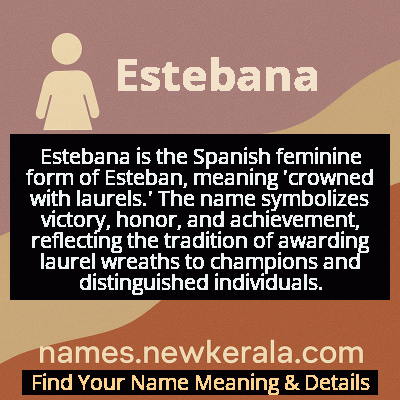Estebana Name Meaning & Details
Origin, Popularity, Numerology Analysis & Name Meaning of Estebana
Discover the origin, meaning, and cultural significance of the name ESTEBANA. Delve into its historical roots and explore the lasting impact it has had on communities and traditions.
Name
Estebana
Gender
Female
Origin
Spanish
Lucky Number
4
Meaning of the Name - Estebana
Estebana is the Spanish feminine form of Esteban, meaning 'crowned with laurels.' The name symbolizes victory, honor, and achievement, reflecting the tradition of awarding laurel wreaths to champions and distinguished individuals.
Estebana - Complete Numerology Analysis
Your Numerology Number
Based on Pythagorean Numerology System
Ruling Planet
Uranus (Rahu)
Positive Nature
Strong sense of order, loyal, practical, and disciplined.
Negative Traits
Stubborn, overly serious, rigid, and prone to feeling restricted.
Lucky Colours
Blue, gray.
Lucky Days
Saturday.
Lucky Stones
Blue sapphire.
Harmony Numbers
1, 7, 8.
Best Suited Professions
Managers, engineers, accountants, organizers.
What People Like About You
Dependability, discipline, practicality.
Famous People Named Estebana
Estebana de los Reyes
Religious Figure
Spanish nun and mystic known for her charitable works and spiritual writings
Estebana Gutiérrez
Educator
Pioneering Spanish educator who established schools for girls in rural Andalusia
Estebana Martínez
Artist
Catalan painter known for her vibrant floral compositions and feminist themes
Estebana Ortega
Community Leader
Mexican-American activist recognized for preserving Hispanic cultural traditions
Name Variations & International Equivalents
Click on blue names to explore their detailed meanings. Gray names with will be available soon.
Cultural & Historical Significance
Throughout Latin America, the name became popular during the colonial period and remains particularly common in Mexico, Argentina, and Chile, where it represents both religious devotion and cultural heritage. The name embodies the traditional Spanish value of family honor and the Catholic ideal of spiritual victory through faith. In many Hispanic communities, naming a daughter Estebana signifies hopes for her to achieve great things while maintaining strong connections to her cultural and religious roots.
Extended Personality Analysis
Women named Estebana are often perceived as strong-willed, dignified, and naturally authoritative. The name's meaning of 'crowned' suggests someone who carries themselves with grace and confidence, often assuming leadership roles effortlessly. They tend to be determined individuals who pursue their goals with unwavering focus, much like the laurel crown symbolizes achievement and victory.
At the same time, Estebanas typically possess a warm, nurturing side that balances their strong character, making them both respected and beloved by those around them. Their combination of strength and compassion allows them to navigate challenges while maintaining meaningful relationships. Many Estebanas demonstrate remarkable resilience in adversity, drawing on an inner fortitude that reflects the enduring nature of the laurel wreath they symbolically wear. This blend of leadership qualities and emotional intelligence makes them effective in both professional and personal spheres.
Modern Usage & Popularity
In contemporary times, Estebana maintains a traditional presence rather than trending popularity. It's most commonly found among Hispanic families seeking to honor cultural heritage and religious traditions. The name sees steady but modest usage in Spain, Mexico, and among Spanish-speaking communities in the United States. While not appearing on modern popularity charts, it retains significance as a classic choice that conveys dignity and cultural roots. Younger generations sometimes use the nickname 'Esteba' or 'Tebana' for a more modern feel, though the full name remains preferred for formal occasions and religious ceremonies.
Symbolic & Spiritual Meanings
Symbolically, Estebana represents victory, honor, and eternal achievement through its laurel crown association. The laurel wreath in ancient times symbolized not just temporary victory but enduring glory and recognition of true merit. This translates to the name representing someone who earns respect through genuine accomplishment rather than seeking superficial praise. The circular nature of the crown also symbolizes completeness, wholeness, and the cyclical nature of life's challenges and triumphs, while in Catholic tradition it connects to spiritual victory and the reward of eternal life through faith.

